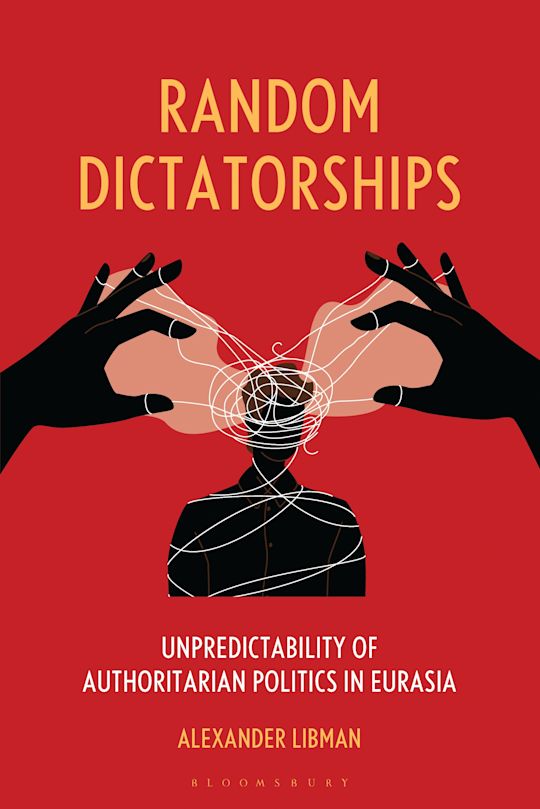- Home
- ACADEMIC
- Politics & International Relations
- Political Ideologies
- Random Dictatorships
Random Dictatorships
Unpredictability of Authoritarian Politics in Eurasia
Random Dictatorships
Unpredictability of Authoritarian Politics in Eurasia
Payment for this pre-order will be taken when the item becomes available
This product is usually dispatched within 2-4 weeks following the publication date
- Delivery and returns info
-
Flat rate of $10.00 for shipping anywhere in Australia
You must sign in to add this item to your wishlist. Please sign in or create an account
Description
Post-Soviet Eurasia continues to puzzle observers, defying expectations of experts. Most Russia watchers failed to predict the full-scale invasion against Ukraine in 2022, and this failure triggered intensive debates and multiple rounds of self-reflection. Random Dictatorships: Unpredictability of Authoritarian Politics in Eurasia argues that the supposedly unexpected turns of Eurasian politics are a manifestation of a deeper phenomenon – researchers' limited ability to predict the policymaking in authoritarian regimes in general. Alexander Libman identifies three main factors making authoritarian politics difficult to predict: mistakes of authoritarian leaders, untransparent competition of elite factions, and omnipresent secrecy cultivated by autocrats. While scholars oscillate between two visions of authoritarian regimes – their presentation as highly rational and capable to adapt and as highly inefficient and doomed to poor performance – Libman suggests that many autocracies alternate between these two extremes in a difficult-to-predict fashion. The book explores three important cases from the post-Soviet Eurasia, when autocracies of this region defied expectations of external observers – Russia's annexation of Crimea in 2014, the Bloody January in Kazakhstan in 2022 and Russia's invasion of Ukraine in 2022. It discusses the reasons for the apparent unpredictability of autocracies in each of these cases, and identifies implications for how authoritarian regimes should be studied.
Table of Contents
List of tables
Introduction
1. The Autocrats' Goals
2. Mistakes
3. Secrecy
4. Informal Coalitions
5. Sovietology and the Collapse of the Soviet Union
6. Annexation of Crimea
7. Bloody January in Kazakhstan
8. Russia's Full-Scale Invasion to Ukraine
Conclusion
References
About the Author
Product details

| Published | 19 Feb 2026 |
|---|---|
| Format | Hardback |
| Edition | 1st |
| Extent | 224 |
| ISBN | 9781666960556 |
| Imprint | Bloomsbury Academic |
| Illustrations | 2 figures and 5 tables |
| Dimensions | 229 x 152 mm |
| Publisher | Bloomsbury Publishing |
About the contributors
Reviews
-
Unpredictability is encoded in the DNA of autocracy, but its implications are complex and not well understood. Drawing on an impressive synthesis of recent research and deep case studies from the Soviet Union, Russia and Kazakhstan, Alexander Libman demonstrates that unpredictability is not just a feature of autocracy; it is also a tool that leaders use to frustrate citizens and academic observers alike. Random Dictatorships: Unpredictability of Authoritarian Politics in Eurasia overflows with rich insights on autocracy and how we study it. It is required reading for anyone interested in the topic.
Tim Frye, Columbia University, USA
-
Alexander Libman, in his new and refreshingly epistemologically honest book, drawing from in-depth studies of several Eurasian dictatorships, underlines not only that the politics and policies in dictatorships are often random but also offers a theoretically grounded explanation for why the murkiness and occasional unpredictability of authoritarian politics is a built-in feature, not a bug. Random Dictatorships is a tour de force that manages to hit the sweet spot between the rigor and generalizability of comparative authoritarianism approach and the area studies' expert knowledge of how dictatorships really work.
Alexander Baturo, author of The New Kremlinology: Understanding Regime Personalization in Russia
-
Time and again, social scientists are left flummoxed by the unpredictable behavior of autocrats. Alexander Libman offers an insightful and provocative explanation for why this is so. Drawing on case studies of surprising decisions by post-Soviet autocrats-most prominently Vladimir Putin's decision to invade Ukraine- Libman argues that the opaqueness and secrecy of autocratic regimes impedes our ability to make accurate predictions about their future behavior. Like few others, this book poses a constructive challenge to all scholars of authoritarian regimes and should be read and debated widely.
Ora John Reuter, University of Wisconsin-Milwaukee, USA



































